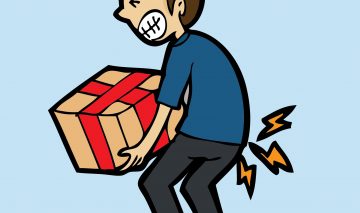
5 Things You Did Not Know About Hernias
Originally posted on https://www.injuredcalltoday.com/5-things-you-did-not-know-about-hernias/
Do you lift heavy things all day at your job? Are you constantly pushing or pulling heavy objects around a shop floor? Do you have abdominal pain as a result of these daily tasks? Did you know that this pain could be a sign you have developed a hernia? Following are five things you did not know about hernias, but should.
What Are Hernias?
A hernia is a protrusion of soft tissue through the walls of the housing of the tissue. Simply put, hernias are tears that have formed in the lining of some portion within your body, and tissue has pushed through the tear. One common cause of hernias is repeated strain on the walls of your stomach or intestines. This strain causes the wall to weaken, and the tissue is able to push through. When the tissue protrudes through the tear, the bulge that can appear is what is referred to as a hernia.
Many people believe that hernias will repair themselves with rest and care. This is not the case. Resting may alleviate the pain the hernia is causing; however, it will not fix the damage that has been done. Left untreated hernia tears can grow larger and become a bigger problem. It is important that you find a hernia doctor if you believe that you have a hernia.
What Causes Hernias?
Hernias are often caused when a person uses force to push or pull items repeatedly, as can be the case with many different types of jobs. As you exert force to move heavy objects, it causes a pulling and pushing on your body, and this can cause the weakening that allows the walls of your stomach or intestines to tear. With continued strain, the tissue will inevitably begin to push through and can get trapped inside the tear. If you are experiencing fever, severe pain, or vomiting while you have a hernia, you should contact your medical provider immediately, as this could signify an infection in the tissue that is trapped inside.
A hernia is a common workers’ compensation injury that can lead to severe complications if left unattended. You need to be attentive to the signals your body gives you and periodically check your hernia. Should you find that the tissue protrusion is not easily pushed back inside the tear when you are laying down and relaxed, this is an indication that you may have a blockage and need to seek immediate medical care.
Hernia Treatment Procedures
While hernias may last a long time before they require surgery, the only way to repair them is through surgery. The procedure for hernia repair will vary slightly for each individual, dependent on health status, weight, location of the hernia, size, and severity. You will need to discuss all of your options with your medical provider to know the specifics. Most commonly, though, hernia surgeries are done as outpatient surgery. What this generally means is that you will have your surgery and barring complications, go home the same day.
Hernia surgery is routinely done laparoscopically. In this procedure, three small laser incisions are made, allowing a camera and mesh to be inserted in the area where the hernia is located. The piece of mesh will be placed over the tear that has permitted the hernia. This mesh will be attached with dissolvable sutures. This mesh will act as support while your body’s natural healing takes over to rebuild the muscle and tissue that has been torn. As the muscle and tissue grow, they will become intertwined with the mesh, making strong mend for the affected area.
After the hernia surgery is complete, the patient is sent home with instructions to avoid exertion for several weeks. It will depend on your specific circumstances; however, the regrowth process typically takes about five to six weeks to become its strongest. It is recommended that during this time you do limited lifting and get plenty of rest. You will also need to visit with your doctor to make sure your wound is healing properly.
Avoiding a New Hernia Work Comp Injury
Once you have had surgery for a hernia, it is essential that you follow the instructions of your care provider to avoid reopening the torn area or causing another hernia to form. After you have fully healed and are ready to return to work, you will need to take precautions to decrease the level of force used daily. Ask for assistance with heavier projects and avoid pushing or pulling that causes you excessive strain. Use dollies or other wheeled equipment if at all possible, to move these heavy items.
If you think that you may have a work-related hernia find a workers compensation doctor near you and seek a medical opinion, remember to take precautions while moving equipment or boxes, and do not overexert yourself. Most importantly, listen to your body, it will tell you when it has reached its limit.
